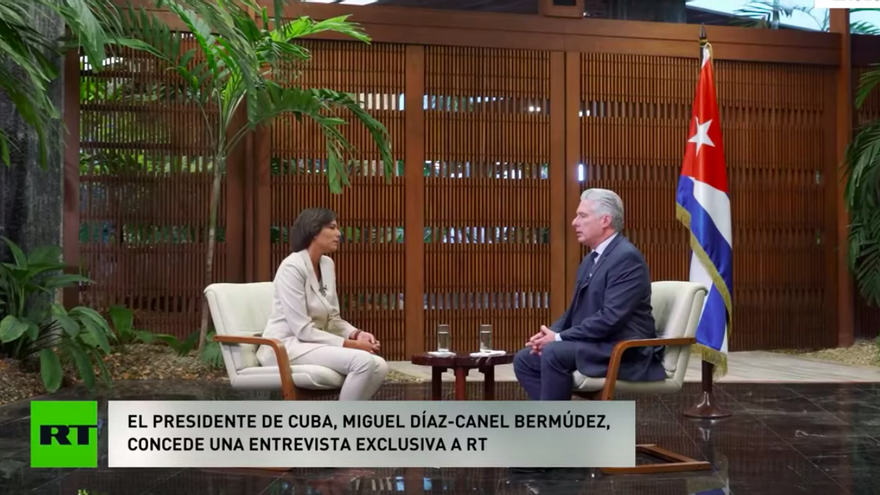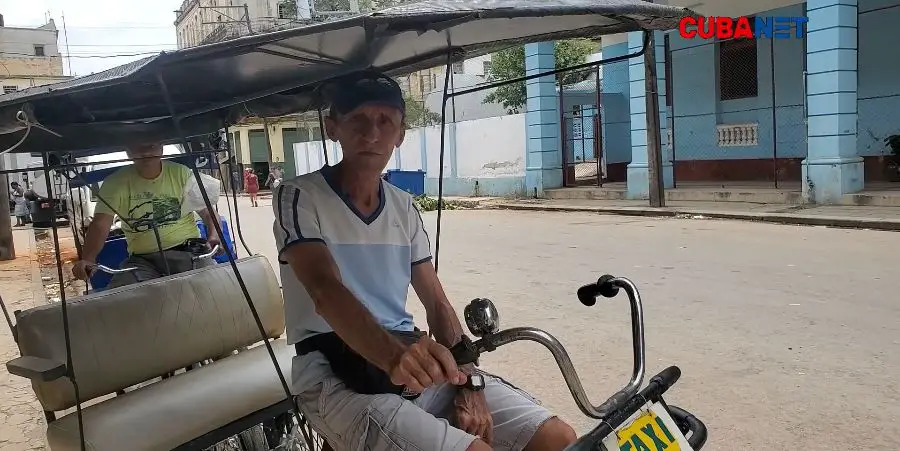Before the cameras of official Russian television, Miguel Díaz-Canel once again declared his unconditional support for Vladimir Putin. In a long interviewdefended the Social Communication Law recently approved by Parliament and called on the peoples of the world to “get away from the dollar.”
In the conversation, broadcast by the Russia Today (RT) television network and available to Cubans starting Tuesday, the president explained to Cuban journalist Aliana Nieves “the place that the nation occupies in the current geopolitical context.”
Díaz-Canel did not mince words: “I consider President Putin as a friend. A sincere friend towards Cuba. And he has also demonstrated it with facts,” he pointed out. “There is an excellent relationship between the Russian Federation and Cuba,” despite the fact that at some point there may have been “misunderstanding or some fracture” between the two countries.
However, all the rough edges were smoothed out, he said, in November 2022, when a Cuban government delegation went to Moscow looking for financial support. “I appreciated President Putin’s enormous understanding of the problems in Cuba, with the situation we were experiencing,” he said.
He stressed what weeks ago he described as his support for Russia’s “confrontation” with the “West”, although this time he limited himself to “strongly condemning” NATO
Díaz-Canel exalted Putin as a “Russian leader and world leader,” with whom he affirmed “agreeing on many points on the international agenda.”
He also referred to the “historical ties” between Havana and Moscow since Soviet times, including, he said, in the family sphere: “There are Cuban-Russian families,” he assured, and went further: “An important part of the talent of the skilled labor force that we have in the country was trained in Russia and there was a whole exchange.”
He stressed what weeks ago he described as his support for Russia’s “confrontation” with the “West”, although this time he limited himself to “strongly condemning” NATO (North Atlantic Treaty Organization) for “expanding its borders” towards Russia.
From Moscow, he summarized, the Island expects food, medicine, tourists, and economic and commercial support. At the end of the president’s speech, Nieves alluded to the “expectation” that the signing of so many bilateral agreements on economic matters was causing, “that must or should be translated into daily life.” Díaz-Canel agreed with the comment, but warned that the changes would take place “in the medium term.”
When asked about the concerns of his detractors about the “advice” of the Kremlin to the Cuban business sector, Díaz-Canel replied that it would be necessary to see “from where those people” who doubt come from.
He argued that the US should be the real concern, as it “tightens the screws” more and more. “They give false expectations of a supposed effort to improve the Cuban situation and everything we experience is the opposite,” she said, but did not clarify if she was referring to the rounds of talks between the Cuban government and Washington.
Regarding the Social Communication Law, Díaz-Canel described it as “historic”, since none of his predecessors in the Government had dealt with the issue and the legislation, in this sense, “was totally outdated”.
Asked about the future role of Cuba in the context of the Brics (the economic alliance between Brazil, Russia, India, China and South Africa), Díaz-Canel again lashed out at the United States and limited himself to saying that the island’s bet is on a “multilateralism” where Russia also has a leading role.
“Brics is proposing to separate from dollarization,” he said, and pointed out his “strategy”: “By moving away from the dollar, the sanctions imposed for its use from the United States are avoided. Cuba is an example of that,” he celebrated, without allude to the fact that international remittances in dollars and euros keep the precarious national economy afloat.
One of the measures to enter into trade with Russiahe added, has been to open subsidiaries of Cuban banks in Russia and branches of Russian banks and financial agencies on the Island, he assured.
Refering to Social Communication Law, Díaz-Canel described it as “historic”, since none of his predecessors in the Government had dealt with the issue and the legislation, in that sense, “was totally outdated.” “It won’t be a law that will last for many years,” he said, because of the “tremendous speed” at which communications technology is advancing.
Regarding the context in which the law was approved and the justification for its severity, the president stuck to the usual script: “Cuba, like other countries, is totally attacked by the media by campaigns of hate, slander, and discredit, which are oriented from imperial power centers supported by the US government,” he declared.
“The networks are less and less democratic and are managed by a small number of transnationals” with their own interests, he argued. Her solution?: “Put our own content,” she said, adding that she intends for the Cuban population “to know how to communicate” in that sense.
Díaz-Canel spoke that he had achieved “consensus” with the citizenry and said he was implementing a “culture of debate”: “This is a paradigm that many around the world defend, but it is broken when they try to fracture the dialogues, when others say things different from those they want to impose,” he said, without alluding to the severity of the recently approved law, which penalizes even interaction on social networks.
He devoted the last part of the interview to China, but did not detail the current state of its relations with the Island. Once again, he limited himself to criticizing the United States and theorizing about the “Taiwan issue,” which threatens “reunification.” that Havana and its allies defend in the Asian giant.
________________________
Collaborate with our work:
The team of 14ymedio He is committed to doing serious journalism that reflects the reality of deep Cuba. Thank you for accompanying us on this long road. We invite you to continue supporting us, but this time becoming a member of our newspaper. Together we can continue transforming journalism in Cuba.








